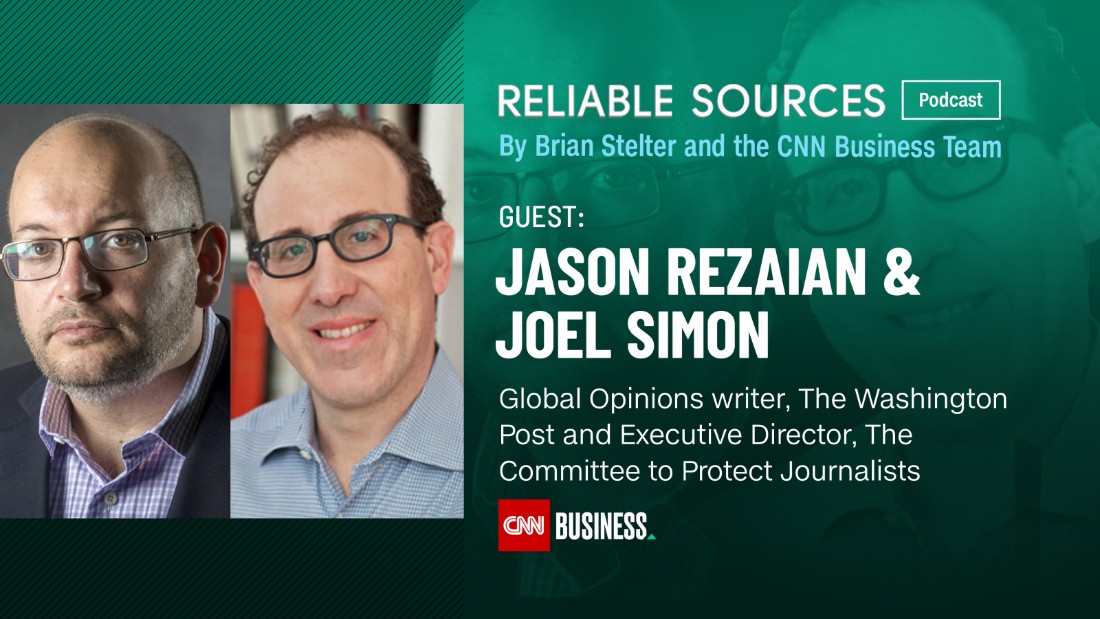
"I never second guess my decision to take that job," Rezaian said. "I went to Iran willingly and willfully with what I took as a personal mission to do a better job of shedding light on a country that here in America we find very misunderstood."
Rezaian, a Global Opinions writer for the Post, recounts his year and a half in Iranian captivity in a new book that hit shelves last week called "Prisoner." Also released last week was Joel Simon's "Why We Negotiate: The Secret World of Kidnapping, Hostages and Ransom," which serves as the perfect companion book to Rezaian's dramatic memoir, with the latter written from the perspective of the prisoner and the former from the perspective of the advocate trying to get him out.
In his book, Simon, the Executive Director of the Committee to Protect Journalists, examines the dark world of kidnappings by "non-state actors," which he defines as "criminals and terrorist groups."
Rezaian and Simon sat down with Brian Stelter on the latest "Reliable Sources" podcast to compare and contrast their work, and to talk about the risks that journalists face today.
"This is really one of the most deadly and dangerous times ever for journalists around the world," Simon said. "They have to, you know, live in repressive places because there's news being made there, and they have to engage with shadowy groups in conflict zones because it's their job. So this is an occupational hazard."
Listen to the podcast here:
The difference between Rezaian's experience and the situations detailed in Simon's book, is that Rezaian was kidnapped by the Iranian government, while Simon focused on individuals who were kidnapped by terrorist groups and criminals. There's a difference between how these two types of hostages are treated by the U.S. government, Simon said.
"When Americans are taken hostage by terrorist groups, there's this framework that says we don't negotiate, there are no concessions," Simon said. "The kind of creative strategies that the US government used to bring Jason home -- I think that Americans' families, whose family members are kidnapped by terrorist groups, are owed that same kind of creative and strategic consideration."
Rezaian was charged with espionage and sentenced to prison on November 22, 2015 and some reports suggested he was facing up to 20 years behind bars. After months of petitioning by US government officials, journalists and media advocacy groups, Rezaian was released in early 2016.
Stelter asked Rezaian what was going through his head during his high-stake experience in Iranian captivity.
"I went through various highs and lows throughout that year and a half. In the initial weeks when I was being kept in solitary confinement, and my captors were telling me that I had already been convicted of the crimes that they were accusing me of, and that I would be executed within days, you don't know what to think," Rezaian said. "And then as time drags on, your fears change and they become more about whether or not efforts on the outside are being made to win your release."
Fortunately for Rezaian, Simon was one of those on the outside working to secure his release. The Committee to Protect Journalists is based in New York City but the nonprofit defends press freedom and journalists around the world.
Upon Rezaian's release, he faced the difficult decision of whether to give interviews about his experience merely a month after arriving in the US. He spoke to two renowned media figures for advice: Anthony Bourdain and Bob Woodward.
Rezaian said Bourdain told him, "If I was you, I'd seize the reins of your own story and write about it, and then go talk about it when you feel comfortable doing it."
"And Bob Woodward gave me very similar advice around the same time, and I thought to myself, 'If Woodward and Bourdain are telling me to do this, I should probably listen to them,'" Rezaian said.
Bagikan Berita Ini














0 Response to "Jail time and kidnappings: An 'occupational hazard' for journalists"
Post a Comment